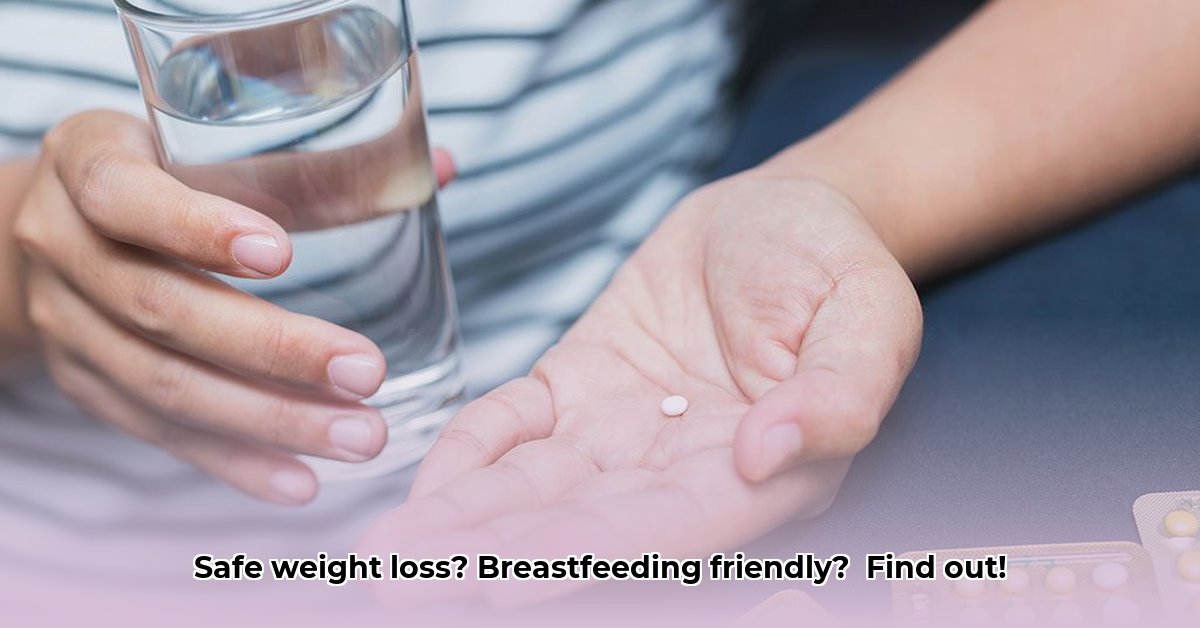
Becoming a mother is a transformative experience, but the postpartum period often brings the added challenge of unwanted weight gain. Many new mothers seek safe and effective ways to lose weight while continuing to breastfeed, leading to questions about weight loss pills. This comprehensive guide explores the complexities of postpartum weight loss, focusing on safe and sustainable strategies, prioritizing both your health and your baby's well-being.
Understanding Postpartum Weight Loss
Your body has just accomplished the incredible feat of growing and nourishing a human being. This physiological process significantly impacts your hormones, energy levels, and overall well-being. Sleep deprivation is common, adding to the physical and emotional demands of motherhood. Therefore, approaching weight loss requires a nuanced understanding of your unique postpartum landscape. It's not simply a matter of willpower; it's a complex interplay of biological and emotional factors.
Weight Loss Pills and Breastfeeding: A Cautious Approach
The market abounds with over-the-counter weight loss pills promising rapid results. However, many of these products lack rigorous scientific backing, particularly regarding their safety during breastfeeding. Many contain ingredients that could potentially harm both you and your baby through breast milk transfer. This underscores the critical importance of prioritizing safety above all else.
Prescription Medications: A Doctor's Guidance
Prescription medications, such as semaglutide, present a different scenario. Some research suggests limited transfer into breast milk. However, this doesn't negate the need for careful consideration and close medical supervision. "The decision to use prescription medications during breastfeeding should be made in consultation with your doctor," says Dr. Emily Carter, OB/GYN at University Hospital. "They will carefully assess your individual health, your baby’s health, and weigh the potential benefits against the risks." The doctor will provide personalized guidance based on your unique circumstances.
The Power of Lifestyle Changes: A Sustainable Approach
Sustainable postpartum weight loss relies on building healthy habits that support both your well-being and your baby's nutritional needs. This is a journey that emphasizes gradual progress, not rapid results.
1. Prioritizing Nutrition
Nourishing your body with whole, unprocessed foods is crucial. Focus on a balanced diet rich in colorful fruits and vegetables, lean proteins (chicken, fish, beans), and whole grains. Adequate hydration is also vital. These nutrient-rich foods support healthy weight loss while ensuring ample milk production for your baby. Have you considered tracking your daily caloric intake to ensure you're meeting your nutritional needs?
2. Gentle Movement
Begin with gentle exercise once cleared by your physician (typically around six weeks postpartum, barring complications). Postpartum-specific exercises or simple walks are excellent starting points. Listen to your body and avoid overexertion. "Consult a physical therapist for a tailored exercise plan," recommends Dr. Anya Sharma, a physical therapist specializing in postpartum recovery at Women's Health Clinic. "They can help you safely and effectively regain your strength and fitness."
3. The Importance of Rest
Prioritizing sleep, even in short bursts, is crucial. Sleep deprivation negatively impacts hormone regulation, hindering weight management and overall well-being. Even short naps can make a noticeable difference.
4. Building a Support System
Connecting with other mothers provides invaluable emotional support. Sharing experiences and offering mutual encouragement can significantly impact your journey. Your healthcare provider is also an integral part of your support network, offering guidance and monitoring your progress.
A Step-by-Step Guide to Safe Postpartum Weight Loss
- Consult your healthcare provider: Before starting any weight loss program, obtain medical clearance and personalized guidance.
- Create a balanced meal plan: Focus on nutrient-dense whole foods, ensuring adequate caloric intake for breastfeeding.
- Incorporate gentle exercise: Start slowly, gradually increasing intensity as your strength and stamina improve.
- Prioritize sleep and rest: Aim for adequate sleep to support hormone regulation and overall well-being.
- Build a support network: Connect with other mothers, family, friends, or a therapist for emotional support.
- Practice patience and self-compassion: Weight loss is a journey, not a race. Celebrate small victories along the way.
Weighing the Options: A Risk-Benefit Analysis
It's critical to evaluate the potential risks and benefits of various weight loss approaches. This cautious approach ensures the safety and well-being of both mother and child.
| Approach | Risk to Mother | Risk to Infant | Benefit | Monitoring Needed |
|---|---|---|---|---|
| Over-the-counter weight-loss supplements | High | High | Low | High |
| Prescription medications (e.g., semaglutide) | Moderate | Low to Moderate | Moderate | Very High |
| Balanced diet & exercise | Low | Low | High | Moderate |
Remember, prioritizing your health and your baby's health is paramount. Your doctor is your best resource for personalized guidance, ensuring a safe and effective weight loss strategy. Sustainable lifestyle changes are key to long-term success, fostering both physical and emotional well-being.